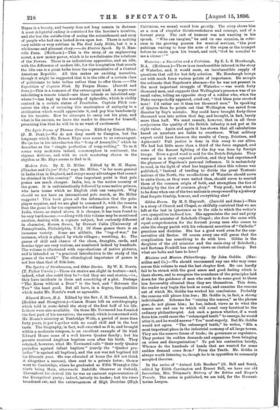The Real Lady Hilda. By B. M. Croker. (Chatto and
Windus.) —This is one of the class of old-fashioned stories. The heroine tells her own story, and tells it without affectation or pretence. She belongs to the sad company of " reduced gentlefolk," and finds how short are the memories of fair weather friends. But Mrs. Croker is not one of the writers of doleful tales. Miss Hayes is a beauty, and beauty does not long remain in distress- A most delightful ending is contrived for the heroine's troubles, and she has the satisfaction of seeing the astonishment and envy of people who had once looked down upon her. There is nothing very subtle or very sublime in The Real Lady Blida, but it is a wholesome and pleasant story.—An Electric Spark. By G. Man- ville Fenn. (Methuen.)—This is the story,of an engineering secret, a new motor power, which is to revolutionise the relations of the Powers. There is an industrious apprentice, and an idle, with the difference of modern life, for the temptation that assails the idle one is a great bribe from the representative of a Central American Republic. All this makes an exciting narrative, though it might be suggested that it is the role of a certain class of politicians to take bribes rather than to offer them.—The Expedition of Captain Flick. By Fergus Hume. (Jarrold and Sons.)—This is a romance of the extravagant kind. A negro race inhabiting a remote island—are there islands so inhabited any. where ?—has kept up the worship of Aphrodite, which is visibly centred in a certain statue of Praxiteles. Captain Flick con- ceives the idea of restoring this masterpiece of antiquity to a civilisation which would appreciate it, and pay him handsomely for his trouble. How be attempts to carry out his plan, and what is his success, we leave the reader to discover for himself, promising him that he will be in no want of excitement.



































 Previous page
Previous page